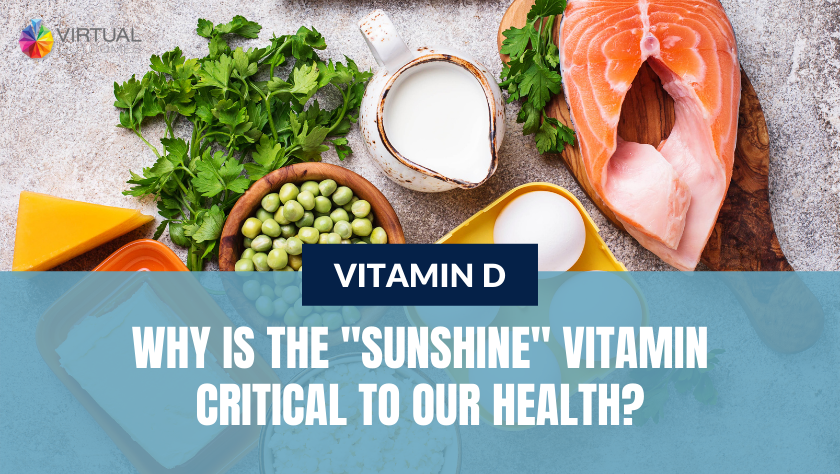 Vitamin D is one of the most important nutrients for our overall health. Not only does it regulate more than 2,000 of the 30,000 human genes but it also plays a significant role in immune function and physical performance.
Vitamin D is one of the most important nutrients for our overall health. Not only does it regulate more than 2,000 of the 30,000 human genes but it also plays a significant role in immune function and physical performance.
In addition, Vitamin D helps the body absorb calcium which promotes strong and healthy bone growth. In this article, we look at why our bodies need vitamin D, how to get the required daily dosage and who is most at risk of a vitamin D deficiency.
What Are The Different Types Of Vitamin D?
Vitamin D is fat-soluble and one of the 13 essential vitamins our bodies need to function normally. We are going to look at two forms, i.e. Vitamin D2 (Ergocalciferol) which is derived from our diet while vitamin D3 (Cholecalciferol) is produced in the skin from the absorption of sunlight. You will find vitamin D2 in the following types of food:
- Oily fish such as mackerel, sardines and salmon
- Egg yolks
- Red meat and liver
- Breakfast cereals and fat spreads (those fortified with vitamin D)
What Is The Daily Recommended Dose?
Babies up to the age of 1 year need 8.5 to 10 micrograms a day while children from 1 year old to adults need 10 micrograms every day. This includes pregnant, breastfeeding women and those at risk of vitamin D deficiency.
It’s difficult to get the daily recommended dose from food alone as most types only contain small amounts. However, combining it with spending five to fifteen minutes in the sun before 11 am and after 3 pm with your forearms and lower legs uncovered and taking supplements can help.
Considering we don’t get a lot of sun in the UK between October and March, the government advises that everyone should consider taking a daily vitamin D supplement during the autumn and winter months.
How To Take Vitamin D Supplements
When taking ‘1-A-Day’ supplement, each dosage contains 10 micrograms (µg) which is equivalent to 400 international units (IU). This is the recommended daily amount for the general population as per government guidelines.
Do not exceed the recommended dose as this level of intake has been specially designed to meet your nutritional needs. Taking more is not recommended but people can take up to 100 micrograms (µg) or 4,000 international units per day.
However, for some people , taking too much over a long period of time can cause a build-up of calcium in the body referred to as hypercalcaemia. This can weaken the bones and damage the kidneys and impact your heart health. Here is some more valuable information from NHS UK.
Benefits Of The Sunshine Vitamin
As previously mentioned, it’s not easy to get your daily dose of vitamin D from food as very few are naturally-rich sources of the vitamin. Instead, your body makes most of the vitamin D from sunshine which is why vitamin D is also known as “the sunshine vitamin”. It provides several important benefits to your body including the following:
- Fights disease (multiple sclerosis and heart problems)
- Reduces stress
- Improves your sleep
- Maintains strong bones
- Helps with weight loss
- Acts as an immune booster
- Helps combat depression
- Can be an effective treatment for chronic pain
- Helps with fall prevention
Who Is Most At Risk Of Vitamin D Deficiency?
For most adults, a deficiency should not be a big concern but some groups of people are at higher risk. While this list is not exhaustive, it highlights several at-risk groups that may have lower levels due to diets, little sun exposure or other factors.
- People with darker skin
- Obese individuals
- Those older than 65 years
- Office workers who spend very little time outside and remain sedentary
- People with malabsorption disorders
- Pregnant or breast feeding women
- People taking certain medications such as anticoagulants and HIV drugs
People who need to be particularly careful are those under the care of a renal, endocrinology or cancer specialist. This could include people with high vitamin D levels, kidney stones, hyperparathyroidism, severe kidney disease, some forms of cancer and a rare illness called sarcoidosis.
Final Thoughts
If you are self-medicating with vitamin supplements, always comply with the instructions on the product label and if prescribed by a GP, make sure you follow their recommendations. If you are giving your children vitamin gummies or sweets, store them in the same way you would other medication.
While you cannot overdose on vitamin D through exposure to sunlight, remember to cover up or protect your skin when outside for long periods. This will reduce the risk of skin damage and skin cancer.
Get your 2022 off to a great start with our newly-released, first pharmacy training course for the year. It aims at supporting you in understanding more about Vitamin D, the role it plays in the body and how pharmacy staff can help their patients. You can access the course here or by clicking the image below.


